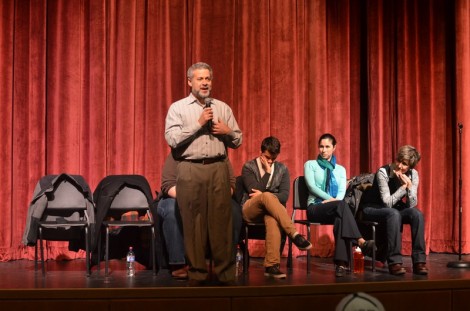WW ’14: PFLAG speaks about experiences with LGBTQ youths
February 2, 2014

On Jan. 30, Parents, Family, & Friends of Lesbian and Gays (PFLAG) visited Wayland High School to educate sophomores about LGBTQ, or lesbian, gay, bisexual, transgender and queer, youth. Queer is an umbrella term for people who are not heterosexual or do not have the same gender as their assigned sex.
Five speakers presented their personal experiences involving LGBTQ youths. These people included Mark Mettler, Zach Kerr, Zac and a representative of the organization, Pam Garramone. Another speaker this year was WHS’s own biology teacher Deanna Hoffman.
The assembly started with Garramone asking students to stand up if they knew an LGBTQ person. Almost every single student stood up. She then proceeded to ask them if they have ever heard any derogatory remarks about the LGBTQ community. Once again, almost every single student stood up.
Garramone’s last question was if students responded to these remarks. Many students stood up, but still it was less than the previous questions. Freshman Drew Brodney volunteered to share his story of how he defended the LGBTQ community when he heard derogatory remarks.
“One time in middle school, this person called one of my good friends a faggot,” Brodney said. “Most of my mom’s friends are gay and lesbian, so I grew up around the culture of accepting them. I was very upset with this, so I told him off and made sure my friend was okay.”
Hoffman followed this activity and shared her experience with her brother, Noah Riseman. Riseman came out to his sister at age 19 in 2001 when he came back home from Georgetown University for Thanksgiving. Riseman woke up Hoffman while she was sleeping and came out to her.
“It was honestly so uneventful. I don’t remember exactly what I said, so I called him and asked him,” Hoffman said. “He told me that I said, ‘Oh, okay,’ and went back to sleep.”
Hoffman wondered why it took so long for Riseman to come out. She later found out that Riseman didn’t realize that he was gay until he was 19. He was laying on the quad at Georgetown University when he realized that he only focused on the men sunbathing in his vicinity and not the women clad in bikinis.
Riseman came out to his father two years later. He was scared because he remembered his father responded to the topic of homosexuality with the phrase ‘no son of mine’ in the past. His father responded to his coming out without any drama. Riseman now lives happily with his partner Michael in Melbourne, Australia.
Mettler spoke next about his child, Maxie, a male-to-female transgender. At age three, Maxie dressed herself in a long shirt and wrapped a belt around her waist to make it look as if she were wearing a dress. This was the first indication that Mettler’s child may not have been of the gender generally associated with her sex.
Throughout her childhood, Maxie was very musically oriented. She wrote and played her own music, was in many stage productions and was part of her school’s choir and a cappella group. Maxie eventually came out as gay when she was in high school, but still identified as male.
Although Maxie doesn’t see herself as one of the binary genders, she portrays herself outwardly as a female and is now taking hormone therapy and treatments for her transition. Mettler is not sure if Maxie wants to go through a full transition with surgeries.
“The best moment for a parent is when your child is able to come out as who they are. That’s not just a statement about gay or transgendered children but all children,” Mettler said, watery eyed. “It’s rare when a child reveals everything about themselves to their parents. They feel comfortable with being just what they are. That’s what a parent wants most; they want a child that they know.”
The next speaker was Kerr, a female-to-male transgender who worked with Massachusetts Safe Schools program for LGBTQ students.
Kerr was born one of three identical triplet girls. At age three when he still identified as female, Kerr would say that he wanted to be a boy when he grew up. From a young age, he always knew that he was a boy. Both Kerr and his older triplet sister Amy were tomboys, but Kerr later realized that his sister eventually grew out of that phase while he had not.
In elementary school, Kerr was not allowed to wear boys’ clothing. Kerr hid his older brother’s clothes in his backpack and would change clothing on the way to and back from school. Eventually in fourth grade, Kerr discovered the term ‘transgender’ and realized that he identified with the definition.
When Kerr was 14, he came out to his family as transgender. He found it hard to articulate how he felt until his mom asked him if he was boy directly, and he answered, ‘Yes.’ Kerr started therapy the next week.
His transition started with social transition by wearing only boys clothes and telling his friends that he was transgender. At the end of his sophomore year, he started medically transitioning with hormone treatments.
“If someone thinks they’re LGBT, they’ll know. Don’t listen to anyone else. Don’t let anyone tell you what you are and what you’re not,” Kerr said. “If you feel like you’re lesbian, gay, bisexual, transgender, pansexual, gender fluid, whatever you are, then that’s what you are.”
























